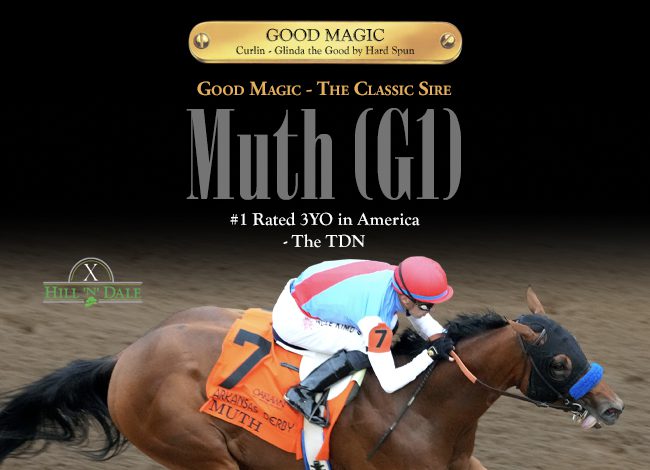By Dean Hoffman
Horse racing recognizes that it must put on a more entertaining product to expand its fan base and retain a diminishing core customer base, and the opening panel at the Global Symposium on Racing & Gaming Symposium addressed how racing can accomplish those goals.
Peter Rotondo, vice president of media and entertainment for the Breeders Cup, said that his organization recognizes that the championships must be “more than just eight races.”
“It's important to include things like fashion and food in the day, too,” Rotondo said. “Having chef Bobby Flay on the Breeders Cup board has helped us with the food angle. We've got to put on a show that works both on TV and also inside the venue. We have to do everything for everyone: owners, bettors, and TV viewers.”
Bill Nader spent many years in management at NYRA and more recently worked at the Hong Kong Jockey Club, said, “The world operates at a much faster pace today, and that's why racing needs entertainment between races.”
He said that the Hong Kong Jockey Club introduced entertainment between races for eight minutes after a race to fill the time prior to horses coming onto the track for the next race.
“We use entertainment on Wednesday night a soft way to introduce people to racing,” he pointed out. “The Happy Valley track owns Hong Kong on Wednesday night.”
Nader pointed out many a major difference between racing in New York and in Hong Kong.
“NYRA had 260 days of racing while in Hong Kong we had 78 days,” he said.
But even on a Wednesday night in Hong Kong the Happy Valley track handles more than the Breeders Cup Day, he noted.
Nader said that racing needs to cater to owners and must remember that “owners bet money.” Tracks must accommodate the needs of owners, he said, as well as appealing to core fans and casual fans.
Amy Zimmerman of the Stronach Group emphasized that she got into racing not from the gambling angle but instead from a simple love of horses.
“I am not a gambler, but I know that the gambler pays my salary and pays my mortgage,” said Zimmerman.
She pointed out that horse racing has so many heartwarming stories with broad public appeal.
“I'm a journalist, and I like to tell stories,” said Zimmerman. “People who are going to gamble are going to watch racing, but you can get people who don't necessarily want to gamble watch race by telling stories. Then you will make it easier for them to become gamblers.”
Mike Tanner of the U.S. Trotting Association said, “The elephant in the room is that racing is not an appealing betting product because of the high takeout rate. We used to be the only game in town, but gamblers now have many other options.”
“It's so much tougher than it used to be,” continued Tanner. “Purses in harness racing are at an all-time high and it is less expensive to own a Standardbred than a Thoroughbred. So we are trying to bring in new owners to harness racing. That's the focus of the US Trotting Association.”
Tanner said that resources in racing are limited and organizations need to narrow their focus to concentrate on what they do bet.
Two veteran writers, Bill Nack and Tim Layden, who have covered racing for Sports Illustrated shared their tales of famous horses and people Tuesday afternoon. Both got their starts as newspaper reporters.
Nack told of how he fell in love with racing after a brief encounter with the great Swaps in the mid-1950s and then he followed the career of Secretariat two decades later.
Nack recalled that Nobel Prize winner William Faulkner covered the 1955 GI Kentucky Derby, which was won by Swaps, for Sports Illustrated.
“Whitney Tower, who covered racing then for Sports Illustrated, was assigned to chaperone Faulkner around Louisville and force him to sit down and write 100 or 200 words of his impressions every night,” said Nack. “Whitney told me that the hardest part of that assignment was keeping Faulkner sober.”
Nack said that Faulkner wrote a lyrical article for Sports Illustrated about that year's Derby, but never mentioned the winner of the race.
Layden recalled his coverage of American Pharoah's pursuit of the Triple Crown in 2015. He stood with trainer Bob Baffert during American Pharoah's final workout prior to the Kentucky Derby and had access to Baffert that few others enjoyed. He won Baffert's confidence and got exclusives that distinguished his reporting, but he did not enjoy the same rapport with American Pharoah's owner Ahmed Zayat.
“My relationship with Zayat was good one day, not so good the next day,” Layden said.
Layden added that publications are more cost conscious than ever today and that covering horse racing is not a priority.
Tom Tuchsmidt, vice president of regional marketing for MGM Resorts International, spoke about the value of customer data to racing. He said that horse racing has done a wonderful job in showcasing its product, but it has not gone a good a job in building and maintaining a relationship with its core customer.
He detailed how the casino industry has become increasingly sophisticated in player development and that has resulted in a boom in casino gaming.
“You have to focus on the casual fan, the avid fan, and the professional–all levels of playing,” he emphasized. “Each customer had value in the gaming business.”
“To a casino, the craps player has a different value than a roulette player,” he pointed out. “At a track the exotics player has more value than a straight wagering player.”
Angel Suarez of Red Circle, an advertising agency in Minneapolis, began his presentation on “Making Smart Data Sexy” with the quote: “He who has the fastest, most accurate, and most complete data wins.”
Suarez says, “Businesses often have lots of data but know don't know what to do with it.”
He said that targeting marketing efforts intelligently is essential because “each dollar invested in marketing should return multiple dollars back.”
He detailed his experiences with ESPN, Gatorade and USA Today to show how those organizations increased the effectiveness of their marketing by using data smartly.
Suarez emphasized that web sites must have immediate visual appeal and updated regularly or customers are likely to go elsewhere. He also spoke extensively on the value of email marketing, but dismissed email blasts in favor of “targeted and smart” emails.
A trio of college professors with doctorate degrees addressed how data gleaned from academic research can benefit the racing industry. They gave examples of how university research provided direct benefits to horse racing, such as determining the cause of Mare Reproductive Loss Syndrome, economic impact studies, and wagering options.
The symposium concludes Wednesday evening.
Not a subscriber? Click here to sign up for the daily PDF or alerts.






